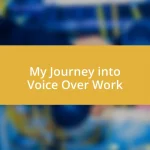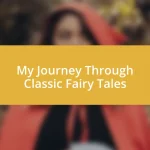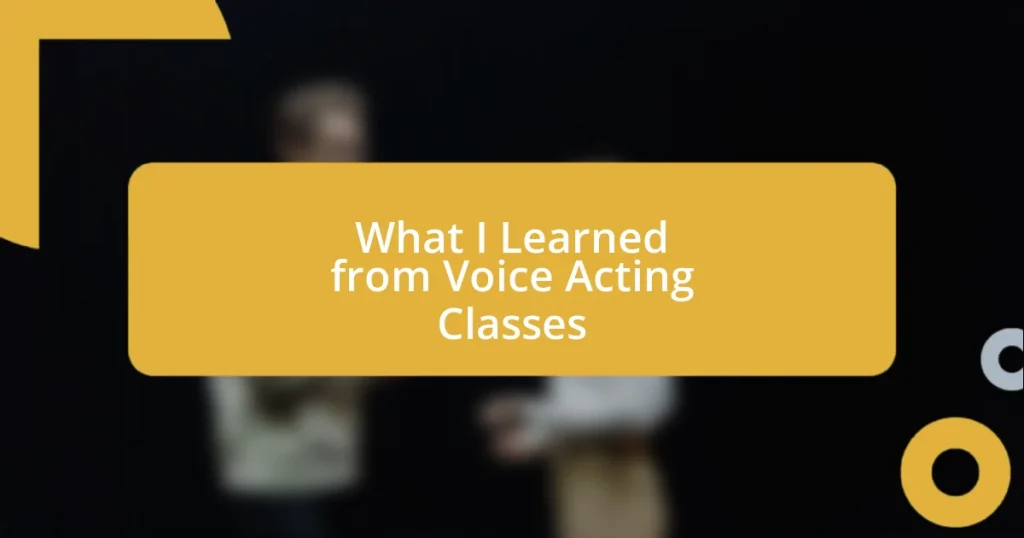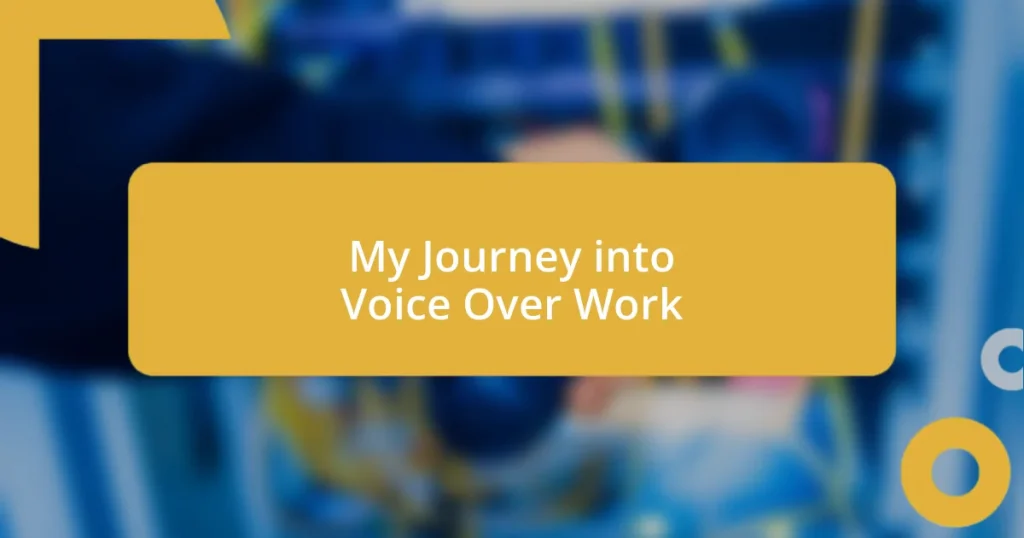Key takeaways:
- Cartoon soundtracks evoke nostalgia and enhance emotional connections to characters and stories, shaping viewers’ experiences.
- Key elements defining iconic soundtracks include catchiness, emotional resonance, character themes, and cultural significance.
- Soundtracks transform storytelling by guiding emotions, enhancing engagement, and creating memorable moments through music and visuals.
![]()
Introduction to Cartoon Soundtracks
Cartoon soundtracks hold a special place in our hearts, often evoking nostalgia tied to our childhood. I can still remember the thrill of hearing the lively theme of “DuckTales” and instantly feeling a rush of excitement. Isn’t it amazing how just a few notes can transport us back to carefree days filled with animated adventures?
These soundtracks do more than accompany the visuals; they enhance the emotions and storytelling. Think about the dramatic score behind “Batman: The Animated Series.” It amplified the tension and intensity of each episode, making us feel every beat of the hero’s journey. Have you ever found yourself humming those iconic melodies long after the show ended?
Moreover, cartoon soundtracks are a brilliant blend of creativity and artistry. They often feature catchy tunes that stick in our minds, almost like earworms. I often find myself singing “The Animaniacs” theme at the most random moments! What do you think it is about these whimsical melodies that makes them unforgettable?
![]()
Significance of Music in Cartoons
Music in cartoons serves as an emotional catalyst, shaping how we perceive characters and stories. I remember the way the playful jingle of “The Flintstones” instantly brightened my mood whenever it played. It’s like the music had a magical ability to make the animated world feel alive and inviting. Have you ever wondered why certain melodies evoke specific memories or emotions?
The incorporation of music provides an auditory identity to characters, making them more relatable. For instance, the cheerful and quirky tunes from “SpongeBob SquarePants” perfectly matched its zany characters, allowing us to connect with them on a deeper level. Whenever I hear that distinctive theme song, I can’t help but envision SpongeBob flipping Krabby Patties with a goofy smile. It’s fascinating how music can make us feel like we know these animated friends personally.
Additionally, the soundtracks often enhance the humor and action sequences in ways that visuals alone cannot. I think back to how the dramatic crescendos in “Looney Tunes” heightened each slapstick moment, making me laugh harder than I ever thought I would. Don’t you think that the combination of sound and sight creates a more engaging experience for viewers, drawing us further into the animated antics?
| Aspect | Impact of Music |
|---|---|
| Emotional Resonance | Shapes viewers’ feelings and nostalgia |
| Character Identity | Creates unique personas through melodies |
| Enhancing Humor | Heightens comedic and action moments |
![]()
Defining Iconic Cartoon Soundtracks
The essence of an iconic cartoon soundtrack often lies in its ability to evoke specific emotions that resonate deeply with us. Take, for instance, the peppy beat of “Scooby-Doo, Where Are You!”—every time I hear that catchy melody, I’m instantly transported back to Saturday mornings, piled up with snacks, solving mysteries alongside my favorite talking dog. The sound is not just music; it encapsulates a feeling of adventure and friendship that stays with us long after the credits roll.
When defining what makes these soundtracks iconic, we can look at several key elements that contribute to their lasting impact:
- Catchiness: The melody sticks with you, often becoming part of your everyday life.
- Emotional Connection: Each tune evokes nostalgia or joy, reminding us of cherished memories.
- Character Themes: Unique motifs that represent specific characters, making them more memorable.
- Cultural Significance: Some soundtracks define an era or a generation, linking them to specific cultural moments.
- Story Enhancement: The music complements and elevates the narrative, guiding our emotional responses.
Reflecting on these elements, it’s clear why certain soundtracks stand the test of time. When I hear the opening sequence of “Teenage Mutant Ninja Turtles,” I can’t help but feel a rush of excitement and camaraderie as if my childhood friends are gearing up for another adventure. There’s something beautifully personal about how these soundtracks shape our experiences, isn’t there?
![]()
Personal Favorites and Their Impact
I’ll never forget the first time I heard the theme song from “DuckTales.” It wasn’t just a catchy tune; it was like a call to adventure that stirred a sense of wonder in me. As I watched Scrooge McDuck and his nephews embark on treasure hunts, the music made every escapade feel epic, leaving me desiring my own adventures beyond the screen. How powerful is it that a simple melody can ignite a spark of curiosity and wanderlust in a child?
Then there’s “The Magic School Bus,” which took educational content and wrapped it in delightful songs. I remember singing along to catchy phrases like “Ride on the Magic School Bus!” It wasn’t merely entertaining; it transformed learning into an exhilarating experience. Don’t you think it’s incredible how music can transform the mundane into something truly enchanting, helping us absorb lessons without even realizing it?
Lastly, the hauntingly beautiful score of “Avatar: The Last Airbender” created a significant emotional impact on me. Each character’s journey intertwined with the music made those moments stick firmly in my memory. It was a rollercoaster of emotions every time the theme played; I felt their triumphs and struggles as if they were my own. In what ways do you think the power of soundtracks shapes our emotional landscapes as we journey through different stories?
![]()
How Soundtracks Enhance Storytelling
Soundtracks are like the heartbeat of storytelling, subtly guiding our emotions and enhancing our engagement with the plot. For instance, I distinctly remember the chilling silence that existed right before the dramatic note dropped in “The Lion King.” That single moment of tension was amplified by the orchestration, making me feel the weight of Simba’s journey as though I were right there alongside him. Have you ever noticed how a single note can send shivers down your spine, turning a scene into a memorable moment?
Again, the playful tunes in “Tom and Jerry” truly showcase how sound can define the tempo of action and humor. I feel like every chase scene was perfectly choreographed with music that heightened the slapstick comedy, which made me laugh harder. There’s something undeniably charming about how those whimsical melodies create a delightful contrast to the chaos on screen, wouldn’t you agree?
Then, there are those reflective moments in “Adventure Time” when the music shifts to something softer, inviting me to connect with the characters’ feelings. I can vividly recall an episode where Finn’s internal struggles were mirrored in the haunting melody. It was like the music peeled back layers of his character, allowing me to empathize with his journey on a deeper level. Isn’t it fascinating how sound can bridge the gap between our experiences and the stories we cherish?
![]()
Conclusion and Final Thoughts
Reflecting on my experiences with iconic cartoon soundtracks, I realize just how deeply they resonate with us long after we’ve finished watching. Each melody and theme is a thread that weaves through our memories, bringing back vivid snapshots of our childhood. How often do you find yourself humming those tunes years later, instantly transported back to a simpler time?
It’s intriguing to consider the role these soundtracks play in shaping not just our emotional responses but also our personal identities. For me, moments spent watching shows like “Animaniacs” weren’t just about laughter; it was about the joy of discovering humor and cleverness through catchy jingles. Has there ever been a song from a cartoon that made you feel like you truly belonged to a community?
Ultimately, these soundtracks are more than just background music; they’re powerful stories in themselves. They evoke emotions and experiences that accompany us throughout life. Sometimes, I catch myself reminiscing about those animated adventures, feeling the warmth of nostalgia wash over me. Don’t you think that’s the magic of music in animation? It lingers, often becoming a vital part of who we are.














